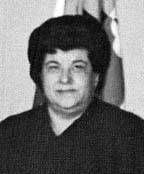Montgomery County Women's History Archive:
40 Women of Historical Significance in Montgomery County
Rita Charmatz Davidson
(1928-1984)
First woman Cabinet Secretary in Maryland’s history
First woman judge on the Maryland Court of Special Appeals
First woman judge on the Maryland Court of Appeals
Rita Charmatz Davidson was born to Russian Jewish immigrants in Brooklyn, New York, in 1928. She attended Erasmus Hall High School and Julliard School of Music for a few years. An excellent piano player, Davidson first wanted to be a concert pianist, but at 14 Davidson abandoned the idea and decided to turn her attention to law. She attended Goucher College in Towson on a scholarship, from where she graduated in 1948, Phi Beta Kappa with highest honors. A few years later, she graduated from Yale Law School in 1951, being one of 12 women in her class of 196 students. After graduation, she entered private law practice with the firm of Liebick and Weyand in Washington, D.C.
After moving to Montgomery County in 1952, Davidson became involved in county politics and government. From 1960 to 1964, Davidson served as vice-chair and then chair of the Montgomery County Board of Appeals. In 1966, Davidson ran for City Council and was declared the winner, although it was later announced that she had lost the election. The loss was a blow for Davidson, who took it as a personal failure. “But I looked in the mirror and decided that I was the same me as before the loss and that somehow something else would come along and it did,” Davidson told a local newspaper. “'Have faith' is one of my slogans – when you do, things happen.” Two years later, after being part of the Maryland-National Capital Park and Planning Commission, her first of many “firsts” of her career occurred. In 1967, she became the Montgomery County Zoning Hearing Examiner, a job that requiredstudying zoning applications and recommending action to the County Council. Davidson convinced the courts in the mid 1960s that attorneys should be able to cross-examine witnesses in zoning disputes. That point is now considered essential for expanding participation in that area of the law. She was the first individual to hold that position, and one of the only women to have done so to the present day.
In 1970 Davidson was appointed Secretary of the Department of Employment and Social Services by Governor Marvin Mandel. She became the first person to hold this position and the first womanCabinet Secretary in Maryland’s history. After being posted, she publicly declared that her primary responsibility was to do something for poor people. Unsatisfied with her office role, she met with welfare mothers and other clients, and demanded to make state service providers accountable for their work, visiting them while they were at work. She also became an outspoken opponent of the state bureaucracy.
In 1972, Davidson’s career was again marked with a first. She was appointed a judge on the Court of Special Appeals, the first woman to hold that position. During her time in this court (1972-1979) she became known for her support of state welfare rights, women’s rights, and individual’s rights. In 1979, she was appointed to the Maryland Court of Appeals by acting Governor Blair Lee III. Again, Davidson was the first woman to sit on Maryland’s highest court. She developed a reputation for being a tough-minded jurist. I have all my life worked harder than a lot of people who have also achieved, Davidson reported to a local Montgomery County newspaper. I think that extra piece of drive, as I call it, does come from the fact that I’m a woman and that I owe it to others to make sure the same opportunities remain open to them.
Davidson belonged to several national and local organizations. She was a member of the American Judicature Society, National Association of Women Judges, and the American, Maryland State, Montgomery County, Women’s and District of Columbia Bar Associations. She received several professional and civic honors during her career. She was the recipient of the Women of the Year Award from the Baltimore Business and Professional Women (1971), the World’s Who’s Who of Women, and the Who’s Who in America. In 1979, she received the Hannah G. Solomon Award from the National Council of Jewish Women. In 1980, she received the Humanitarian Award from the Baltimore Citizens Awards Committee. In 1983, she was presented with the Woman of Commitment Award by the Anti-Defamation League. In 1985, she was honored posthumously with the Rita C. Davidson Award, the highest award given by the Women’s Bar Association of Maryland. Also that year, she was inducted into the Maryland Women’s Hall of Fame. Davidson also received other recognition, including the Outstanding Contribution by a Woman in the Field of Law by the New York Women’s Bar Association (1976), the Maryland’s Distinguished Citizen’s Award, and the Person of the Year Award by the Montgomery County Sentinel newspaper.
Davidson credited her parents for her success and education. "I think it was the atmosphere in my house," she told a Montgomery County reporter in 1984. "My parents came from a culture which believed the way in which you live a life usefully and well is to do good things, to help other people. In order to do that, you have to know a lot. To study and learn was very highly regarded." Nevertheless, the responsibilities and demands of her job often made it difficult to balance family life and work. "I make a deliberate effort to make sure that the family is not neglected," Davidson commented to a local newspaper in 1970. "Evenings, weekends and holidays we try to make up in quality what we lack in quantity of time spent with the children." However, Davidson always credited the effort of balancing both worlds to her family members, especially her husband, who unconditionally supported all her career decisions. Davidson married her fellow Yale law school classmate, David Davidson, in 1950.
During all her career, Davidson was well known for her compassion, her great sense of humor, her love for her family and her pride in Montgomery County, the county in which she had chosen to live. She also was known for her intellectual capacity, her profound concerns for human rights, and her commitment and advocacy to the poor and unprivileged. Davidson had two children. Davidson died in 1984 at age 56 after a long battle with cancer.
SOURCES:
- The Montgomery County Historical Society Library
- www.mdarchives.state.md.us
- www.montbar.org/archives
-
www.mdarchives.state.md.us/msa/educ/
exhibits/womenshall/html/whflist.html

